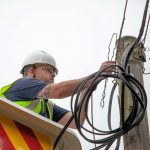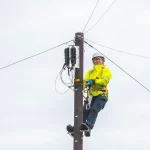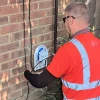Ofcom See Average UK Fixed Broadband ISP Speeds Hit 65.3Mbps

The UK telecoms regulator, Ofcom, has posted a small interim update to the data they hold on fixed line home broadband ISP speeds, which reveals that the average (median) UK download speed has increased to 65.3Mbps (up by 10% from 59.4Mbps six months ago) and uploads hit 15.5Mbps (up by 45% from 10.7Mbps).
Ofcom’s study is based off data gathered during September 2022 via both custom modified routers from SamKnows (panel size of around 2,600 homes) and ISP supplied routers with the company’s Agent software onboard. This method of testing, which is conducted at router level during idle periods of use, is extremely accurate, not least because it can remove the negative impact of issues like local network congestion and slow WiFi.
The full and much more detailed annual update is due to be published later this year and thus this report is fairly sparse, but it does provide a useful update on progress based on real-world speed testing (NOT network availability). As you’d expect, the main driver of rising speeds continues to be the growing adoption of ultrafast class broadband packages and related network expansions (FTTP etc.), but many people have yet to upgrade.
Advertisement
The proportion of homes in Ofcom’s research with broadband connections that use a “superfast” package (advertised speeds of 30Mbps+) was 93% (up from 92% six months ago), while just 10% (up from 8%) were on “ultrafast” packages (Ofcom defines this as 300Mbps+).
The regulator also noted that less than 3% of households had average download speeds of below 10Mbit/s (USO level), with cable (Virgin Media) connections offering the highest average download speed (1139Mbit/s). Virgin Media also had the joint-fastest average upload speed, with BT’s 300 Mbit/s service, at around 51Mbit/s.
Average UK Median Download Speeds (Upload)
➤ 2022 [Sept 2022] = 65.3Mbps (15.5Mbps)
➤ 2022 [March 2022] = 59.4Mbps (10.7Mbps)
➤ 2021 = 50.4Mbps (9.8Mbps)
➤ 2020 = 50Mbps (9.8Mbps)
➤ 2019 = 42.1Mbps (9.3Mbps)
➤ 2018 = 37Mbps (6Mbps)
➤ 2017 = 36Mbps (5Mbps)
The new data also includes a comparison of average speeds (median) by broadband technology, although this table doesn’t split down by package class and is heavily influenced by the strong take-up of 100Mbps+ plans on Virgin Media’s much more widely available Cable network (hence why FTTP looks slower).

Advertisement
We expect the full report, which will use more recent data, to be published around the end of summer or early autumn.
Mark is a professional technology writer, IT consultant and computer engineer from Dorset (England), he also founded ISPreview in 1999 and enjoys analysing the latest telecoms and broadband developments. Find me on X (Twitter), Mastodon, Facebook, BlueSky, Threads.net and Linkedin.
« Virgin Media O2 UK Ponder £3bn Acquisition of Rival CityFibre























































I think broadband speed shave come along way compared to when I used to jump on dial-up back in he early 2000’s at my mum’s house and now we’re capable of some blazing speeds.
It seems like only a matter of time until my current speed (72Mbps – 80Mbps sync rate) is going to drop below the average… good for others but sad for me.
72Mbps – 80Mbps is better than a lot of people get, much better.
“72Mbps – 80Mbps is better than a lot of people get, much better”
um no this literally said different.
back up your claims.
It literally says that half of UK users (around 14.5 million) get 65.3 Mbps or less, so yes, many people will get much less than 72-80 Mbps.
I went from 1.5Mbps to 950Mbps, that should have helped the average 🙂
We are making progress, just hope the momentum continues (especially as a Londoner still on ADSL2 – Community Fibre are taking a while!)
Wonder what the ratio of rollout is like between the alt nets, VM and Openreach.
ADSL? Wow, I know of one person who is still on ADSL, but they live very close to the exchange and it is cheap. They don’t do streaming, they do listen to music online, but ADSL can cope with that.
@Ad47uk, ADSL is still very common in London, especially the Westminster area.
ADSL2 averages around 18 to 24mbps down. ADSL1 is around 8 to 10mbps so if you are a single person or two people and don’t upload a lot of content, it is enough to do everything including hd streaming and downloading for a fraction of the price.
Still thousands of properties here in rural Devon with no option except ADSL, usually on long lines too, 1 to 4 Mbps is typical. Most of these premises have no planned improvements coming either.
So from a few thousand homes they can tell this? I doubt it very much, about as useful as surveys.
To within a small margin of error: yes. Yes they can. Statistics is clever like that. As are surveys when properly done.
https://en.wikipedia.org/wiki/Margin_of_error
Margin of error on a poll with 1,000 honest and well selected participants nationwide is within 2-3% of the actual result of everyone.
This has more participants and a smaller total group: households not voters, along with data on ISP speeds and sales figures so should be pretty accurate.
Mmm, I think surveys are made to look good for the people that are doing them most of the time, and since Ofcom is doing this survey they need to make it look good.
Sure, the average speed will have to increase with more FTTP services being introduced and people taking it up, but not as quickly as Ofcom thought they would.,
I still know plenty of people that even with FTTP available to them, still have FTTC, and they don’t seem interested in moving. 2 households I know of have just recontracted for FTTC for another 18 months, another one have done so for 12 months.
Someone told me that now broadband does a monthly FTTC contract for the same price as the 12-month one, but you pay a set-up fee, I may go for that.